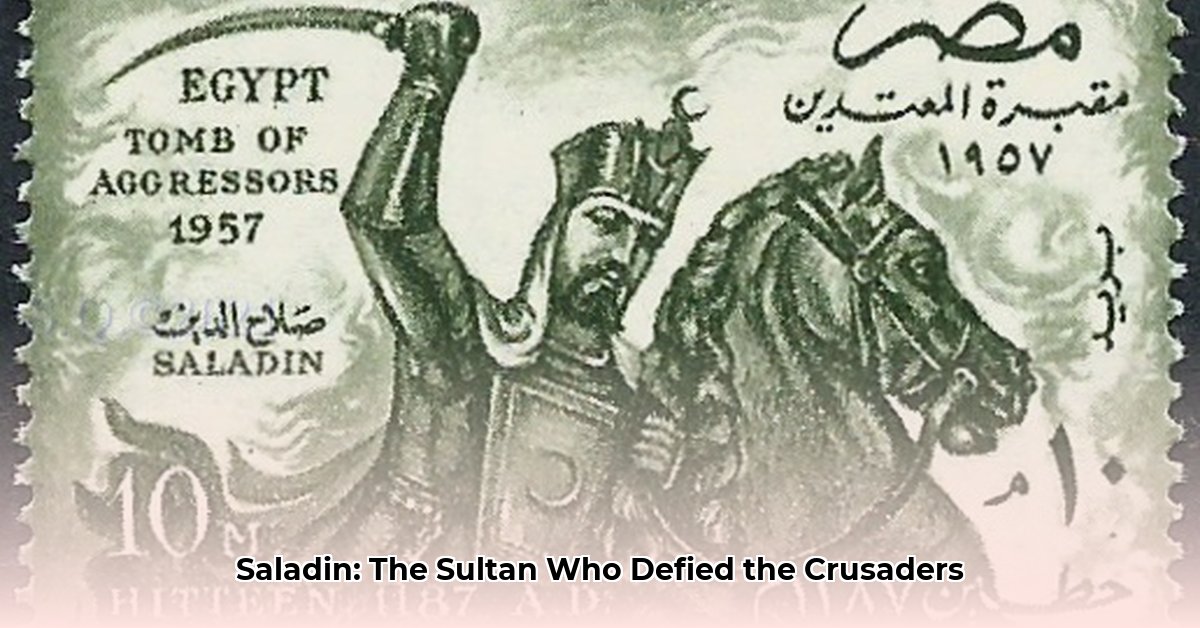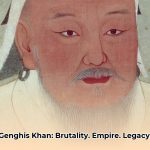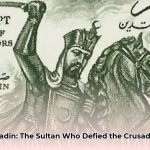Saladin, a name synonymous with military prowess and Islamic unity, was a pivotal figure in the 12th-century Middle East. More than just a warrior, he was a shrewd strategist, a skilled diplomat, and a pragmatic ruler. This article delves into the life and legacy of Saladin, exploring his rise to power, his military campaigns against the Crusaders, his administrative reforms, and the enduring impact of his reign. We will also examine the complexities of his character and the ongoing debates surrounding his historical significance. For a look at another powerful organization of the era, learn more about the Knights Templar.
Saladin: Unifier and Strategist
Saladin’s story is one of ambition, military genius, and political maneuvering. Born into a Kurdish family, he rose through the ranks to become the Sultan of Egypt and Syria, uniting disparate Muslim factions under his banner. His military skills were undeniable, culminating in the decisive Battle of Hattin in 1187, which paved the way for the recapture of Jerusalem. However, his success was not solely based on military might. He was also a skilled diplomat and administrator, implementing reforms that stabilized his realm and fostered a sense of unity among his diverse subjects.
From Soldier to Sultan: Saladin’s Ascent to Power
Saladin’s early life was steeped in military affairs. He gained valuable experience serving under his uncle, Shirkuh, a commander in the Zengid army. Following Shirkuh’s death, Saladin rose to become the vizier of Egypt, a position he used to consolidate his power and establish his own dynasty, the Ayyubids. His rise was not without its challenges. He faced opposition from rival factions and had to navigate the complex political landscape of the region. However, through a combination of military skill, political acumen, and strategic alliances, he overcame these obstacles and established himself as the dominant force in the region.
Military Campaigns: Hattin and the Recapture of Jerusalem
Saladin’s military achievements are legendary. The Battle of Hattin in 1187 was a turning point in the Crusades. Saladin’s forces decisively defeated the Crusader army, capturing key leaders and seizing control of much of the Holy Land. The victory at Hattin paved the way for the recapture of Jerusalem, a city of immense religious and symbolic importance to both Muslims and Christians. Saladin’s capture of Jerusalem was notable for its relative lack of bloodshed compared to the Crusader conquest of the city nearly a century earlier. He allowed many Christians to leave the city peacefully, demonstrating a degree of compassion that was unusual for the time.
Beyond the Battlefield: Saladin’s Administrative and Economic Reforms
Saladin’s legacy extends beyond his military victories. He was also a capable administrator who implemented a series of reforms aimed at stabilizing and strengthening his realm. In Egypt, he reformed the tax system, streamlined the bureaucracy, and promoted trade. He also invested in infrastructure projects, such as roads and canals, which further boosted the economy. His reforms helped to create a more stable and prosperous society, which in turn strengthened his rule and allowed him to focus on his military campaigns against the Crusaders.
Saladin and the Third Crusade: A Clash of Civilizations
The recapture of Jerusalem sparked the Third Crusade, a massive effort by European powers to reclaim the Holy Land. Led by Richard the Lionheart of England, the Crusaders clashed with Saladin’s forces in a series of battles and sieges. Despite Richard’s military prowess, he was unable to recapture Jerusalem. The Third Crusade ultimately ended in a stalemate, with a treaty that allowed Christian pilgrims access to Jerusalem but left the city under Muslim control. Saladin’s ability to withstand the Third Crusade cemented his reputation as a formidable leader and a defender of Islam.
The Enduring Legacy of Saladin
Saladin died in 1193, leaving behind a vast empire that stretched from Egypt to Syria. His legacy has endured for centuries, both in the Muslim world and in the West. He is remembered as a brilliant military commander, a skilled diplomat, and a just ruler. He is also admired for his chivalry and his compassion, even towards his enemies. His story continues to inspire and fascinate, reminding us of the complexities of history and the enduring power of leadership.
Saladin’s Economic Impact on Egypt: Stability and Trade
Saladin’s reign brought significant economic changes to Egypt, a country he inherited after the decline of the Fatimid Caliphate. His economic policies aimed to stabilize the region, promote trade, and improve the lives of his subjects. But how did Saladin’s economic policies impact Egypt’s long-term prosperity? Did these changes lead to lasting growth, or were they merely temporary fixes?
Inheriting an Unstable Economy
When Saladin took control of Egypt, he inherited an economy plagued by instability and mismanagement. The Fatimid Caliphate had been weakened by internal conflicts and corruption, leading to a decline in trade and a depletion of the treasury. Saladin’s first task was to restore order and stability to the region, creating a foundation for economic growth.
Key Economic Reforms Implemented by Saladin
Saladin introduced several key economic reforms aimed at revitalizing Egypt’s economy:
- Taxation Reform: He streamlined the tax system, making it more efficient and equitable. This helped to increase government revenue and reduce the burden on the peasantry.
- Infrastructure Development: He invested in infrastructure projects, such as roads, canals, and bridges, which facilitated trade and improved transportation.
- Trade Promotion: He encouraged trade with both Muslim and Christian merchants, fostering economic exchange and increasing prosperity.
Long-Term Economic Impact and Scholarly Debate
The impact of Saladin’s economic policies on Egypt’s long-term prosperity is a subject of ongoing debate among historians. Some argue that his reforms laid the foundation for sustained economic growth, while others believe that their effects were limited by various factors, such as ongoing conflicts and political instability.
A Balanced Perspective on Saladin’s Economic Legacy
While the long-term economic impact of Saladin’s policies remains a topic of scholarly debate, there is no doubt that his reforms brought significant improvements to Egypt’s economy during his reign. He restored stability, promoted trade, and improved the lives of his subjects. His economic policies, combined with his military successes and his administrative skills, helped to establish the Ayyubid dynasty as a major power in the Middle East.
Saladin’s Diplomatic Strategies: Navigating a Complex World
Saladin’s military achievements are well-documented, but his diplomatic skills were equally crucial to his success. He navigated a complex political landscape, forging alliances, and negotiating with both allies and enemies. Saladin’s Diplomatic Strategies in the 12th-Century Middle East involved a combination of shrewdness, pragmatism, and a deep understanding of regional power dynamics.
Building Alliances and Unifying the Muslim World
Saladin’s primary goal was to unite the Muslim world against the Crusader presence in the Holy Land. To achieve this, he needed to overcome deep-seated divisions and rivalries among various Muslim factions. He employed a variety of diplomatic strategies to build alliances and foster a sense of unity:
- Strategic Marriages: He arranged marriages between members of his family and the families of other Muslim rulers, cementing alliances and strengthening ties.
- Patronage and Gifts: He distributed patronage and gifts to key figures, securing their loyalty and support.
- Religious Appeals: He appealed to shared religious sentiments, emphasizing the importance of defending Islam against the Crusader threat.
Negotiating with the Crusaders
While Saladin was committed to driving the Crusaders out of the Holy Land, he also recognized the importance of diplomacy and negotiation. He engaged in numerous negotiations with Crusader leaders, seeking to find a peaceful resolution to the conflict.
Limitations and Challenges
Despite his diplomatic skills, Saladin faced significant limitations and challenges. The Muslim world remained deeply divided, and many rulers were unwilling to fully commit to his vision of a united front against the Crusaders. He also faced opposition from within his own ranks, as some of his advisors and commanders questioned his diplomatic approach.
Saladin’s Enduring Diplomatic Legacy
Despite these challenges, Saladin’s diplomatic strategies played a crucial role in his success. He built alliances, fostered unity, and negotiated with his enemies, all while remaining committed to his ultimate goal of liberating the Holy Land. His diplomatic legacy continues to inspire leaders and diplomats today, reminding us of the importance of communication, compromise, and understanding in resolving complex conflicts.
Economic Reforms Under Saladin: Impact and Legacy
Saladin’s reign marked a period of significant economic transformation in Egypt and the surrounding territories. While his military achievements often take center stage, his economic policies played a crucial role in stabilizing his realm and fostering prosperity. Exploring the Economic Reforms Under Saladin and their Long-Term Impact on Egypt provides a deeper understanding of his multifaceted leadership.
Saladin’s Economic Policies: A Closer Look
Saladin implemented a range of economic reforms aimed at streamlining administration, promoting trade, and ensuring the efficient collection of taxes. These policies were designed to strengthen his government and provide the resources needed to fund his military campaigns. Among his key economic initiatives were:
-
Standardization of Weights and Measures: This facilitated trade and reduced fraud, promoting economic activity.
-
Development of Infrastructure: Investments in roads, canals, and ports improved transportation and facilitated commerce.
-
Promotion of Agriculture: Encouraging agricultural production ensured food security and provided a surplus for trade.
The Long-Term Impact: A Subject of Debate
The long-term impact of Saladin’s economic policies on Egypt and the wider Ayyubid empire remains a subject of scholarly debate. Some historians argue that his reforms laid the foundation for sustained economic growth, while others suggest that their effects were limited by various factors, such as ongoing conflicts and political instability.
Historical Perspectives and Interpretations
Historians offer diverse perspectives on Saladin’s economic legacy:
-
Positive Assessments: Some scholars highlight the positive effects of his reforms, such as increased trade, improved infrastructure, and a more efficient tax system.
-
Critical Analyses: Other historians emphasize the limitations of his policies, pointing to the ongoing conflicts and the challenges of governing a vast and diverse empire.
Conclusion
The Economic Reforms Under Saladin had a significant impact on Egypt and the wider Ayyubid empire. While the long-term effects of his policies remain a subject of scholarly debate, there is no doubt that his economic initiatives contributed to the prosperity and stability of his realm.
- Discover Life in a Medieval Castle: Beyond Battles & Banquets: Unveiling Daily Life - August 2, 2025
- Scipio Africanus: Hannibal’s Nemesis: Rise, Fall, and Legacy - August 2, 2025
- Unveiling Superorganisms: Are Ant Colonies One Mind? - August 2, 2025















